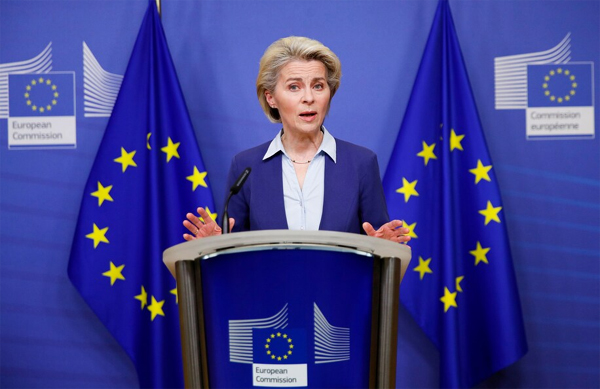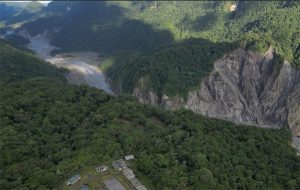
Emily Rauhala, Karla Adam, William Booth, Greg Miller and Loveday Morris, Washington Post
BRUSSELS
Energiesnet.com 02 23 2023
European leaders who had been emphasizing diplomacy with Moscow rapidly shifted gears Tuesday after Russia deployed troops into two separatist regions of Ukraine.
German Chancellor Olaf Scholz said Berlin would halt the Nord Stream 2 gas pipeline project between Russia and Germany, dealing a blow to Russia’s energy sector. British Prime Minister Boris Johnson announced what he said was a “first barrage” of sanctions, targeting five Russian banks and three Russian billionaires who are members of President Vladimir Putin’s inner circle. The European Union’s foreign policy chief, Josep Borrell, said the blocwould blacklist more lawmakers and officials and restrict Russian access to the E.U.’s financial and capital markets.And the foreign ministers representing Group of Seven economies agreed to “coordinated escalatory sanctions” against Russia, as well.
But experts described the initial wave of European sanctions — together with those announced Tuesday by the United States — as incremental and unlikely to alter Putin’s calculations in the short term. Instead, the response by the West set the stage for a protracted pressure campaign, with Putin and European leaders all weighing their next moves.
“This is going to be much more of a slow burn,” said Julia Friedlander, a senior fellow at the Atlantic Council who served as the top White House adviser on the European Union and economic issues from 2017 to 2019.
Even if Western governments impose heavier penalties in the coming weeks, it could take months for any measures to have a significant impact on Russia’s oligarch class or economy.
As Russia faced rounds of overlapping sanctions in recent years, for its annexation of Crimea and poisoning of dissidents, Putin embarked on an effort to stockpile enough foreign currency, gold and other assets to survive being cut off from Western credit and markets, at least temporarily, Friedlander said.
“It’s not going to have the immediate impact you would want sanctions to have as a deterrent,” she said, though she added that Western governments have enough weapons to cause “extreme economic consequences.”

Germany and Nord Stream 2
Germany’s decision to suspend certification of the Nord Stream 2 pipeline may have been the most severe blow delivered from Europe on Tuesday, jeopardizing a multiyear project likely to be worth billions to Russia over its lifetime.
Still, the hit will not be felt instantly. Even without the suspension, the project faced a long regulatory review process before it was due to come online.
Whether to terminate the pipeline plan had been a sticking point between the United States and the German government as measures to deter Russian aggression were examined in recent weeks. President Biden had vowed that if Russian troops crossed into Ukraine, “there will be no longer Nord Stream 2. We will bring an end to it.” Scholz — the one in position to end it — had been more evasive, saying only that “all options” were on the table when it came to punitive fiscal measures toward Moscow.
But on Tuesday, the chancellor said his government had withdrawn an Economy Ministry report on the impact the pipeline would have on the security of Germany’s gas supplies.
“That may sound technical, but it’s a necessary administrative step,” he said in a news conference. “Without this certification, Nord Stream 2 cannot start to operate.”
Scholz gave no clear indication of how long the certification process for $11 billion pipeline project might be delayed, but when asked whether it might be restarted, he said the process of reassessing the report “will surely drag on.”
“Germany did the right thing when it came down to it,” said Brian O’Toole, a former sanctions adviser at the U.S. Treasury Department’s Office of Foreign Assets Control. “It’s a project with huge geopolitical ramifications beyond the narrower economic ones.”
“That doesn’t mean that there aren’t material economic costs, even if those are smaller than major bank sanctions,” said O’Toole, also an Atlantic Council senior fellow. “How much did [Russian state-owned gas company] Gazprom spend on this? It’s billions of dollars. There’s certainly an effect there.”
But Peter Beyer, the German government’s coordinator for transatlantic cooperation and a parliamentarian with Germany’s Christian Democrats, criticized Scholz for not making a bolder political decision.
“Chancellor Olaf Scholz continues to hide behind an administrative act due to disagreements within the party,” he said, referring to reported splits within Scholz’s center-left Social Democrats on how to deal with Russian aggression. He accused Scholz of “passing the buck” to his coalition partners the Greens, who run the Economy Ministry.

Britain and the oligarchs
In Britain, Johnson has offered plenty of tough rhetoric, warning that Putin is planning “the biggest war in Europe since 1945.” But analysts and even some lawmakers in the prime minister’s party were underwhelmed by the sanctions announced Tuesday — against well-insulated banks and previously targeted oligarchs who have probably kept their assets out of Britain.
The three billionaires, all involved in the energy sector, have been on the U.S. sanctions list for years. Gennady Timchenko of the Volga Group investment firm and Boris Rotenberg, co-owner of SGM (Stroygazmontazh) Group, were hit with U.S. sanctions in 2014 after the Russian invasion and annexation of Crimea. Igor Rotenberg, Boris Rotenberg’s nephew and formerly the majority shareholder in Gazprom Drilling, was placed under U.S. Treasury Department sanctions in 2018.
Gavin Wilde, a former director for Russia, Baltic and Caucasus affairs on the National Security Council who served in the Trump administration, called the British targets “low-hanging fruit.”
“The banks they hit were kind of set up by Russia in expectation that sanctions were coming,” he said, meaning their international exposure is limited. As a result, he said, there will be “more symbolism in the U.K. than impact.”
Similarly, Wilde said, targeting Timchenko and the Rotenbergs may send a message to Putin “personally,” because of their reported ties to the Russian president and their “patronage over some of his own finances.” But Wilde noted the absence of more-prominent figures, including Roman Abramovich, owner of the Chelsea Football Club in England.
Tom Keatinge, director of the Center for Financial Crime and Security Studies at RUSI, a London think tank, noted that nongovernmental organizations have identified more than 150 people with connections to Britain that could have been targeted under legislation passed on Feb. 10.
“You don’t take a peashooter to a gunfight,” Keatinge said, expressing his dismay with the sanctions announced so far.
He disagreed with the strategy to hold back some firepower should things escalate. “Getting someone to change the actions they’ve already taken is much more difficult than stopping someone from doing it in the first instance,” he said, adding that Western sanctions on Russia after it invaded Crimea in 2014 had little impact.
Wilde said Britain’s financial entanglements with Russian oligarchs constrain its options. “The more rocks they kick over, the more of an indictment it is of how lax they’ve been the last couple decades on dirty Russian money flooding their system,” he said.

E.U. comes together on incremental sanctions
While Russian tanks were rolling into eastern Ukraine, E.U. diplomats scurried between calls and meetings to hash out their response. They emerged Tuesday evening with agreement on an initial round of penalties, suggesting there would be more to come.
The E.U. sanctions will target people and entities linked to Russia’s latest moves, including 351 members of the State Duma, the lower house, who voted to recognize the two breakaway regions in eastern Ukraine.
The bloc will also target the ability of the Russian state to access the E.U.’s capital and financial markets and services, “limiting the financing of their policies,” Borrell said. In a tweet — which later appeared to have been deleted — he said there would be no more shopping in Milan, diamonds in Antwerp or partying in Saint-Tropez for Russian officials.
European Commission President Ursula von der Leyen praised what she called a “solid” package that “contains a number of calibrated measures.”
But the package was less ambitious than some expected — and the impact on Putin, or his plans, remains to be seen.
For weeks, European officials have been warning of “massive” sanctions in the case of further Russian escalation. Now, European officials say Russian troops are on the ground in eastern Ukraine, but the “mother of all sanctions” package they promised is being held in reserve.
Europe and its allies appear to be opting for a step-by-step approach, said Edward Hunter Christie, a senior research fellow at the Finnish Institute of International Affairs.
“It is incremental,” he said. “The measures are not the strongest from an economic-impact perspective, but they do have high symbolic value and they are important as a first signal of resolve or credibility.”
Christie said he expects Europe and the United States to meet further Russian moves with tougher measures, such as export controls.
But the E.U. remains split on what counts as an escalation or invasion by Russia, as well as what specific measures the sanctions should include.
Over the weekend, Ukrainian officials urged Europe to impose sanctions on Putin before he acted. “We don’t need your sanctions after the bombardment will happen and after our country will be fired at, or after we will have no borders and after we will have no economy or part of our country will be occupied,” Ukrainian President Volodymyr Zelensky said in an interview with CNN.
But U.S. Secretary of State Antony Blinken said the United States and its allies did not want to lay out their plans “until the tanks are actually moving, the planes are actually flying, the bombs are actually dropping.”
Now, U.S. and European leaders may face questions about why they did not act sooner or do more.
“These are strong sanctions, but they are survivable,” Christie said. “My suspicion is that if the situation escalates much more seriously, there will be additional measures that have not been announced yet or even discussed.”
Adam, Booth and Miller reported from London. Morris reported from Przemysl, Poland. Quentin Ariès in Brussels and Rick Noack in Paris contributed to this report.
washingtonpost.com 02 22 2023











